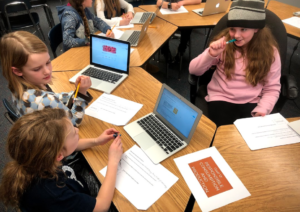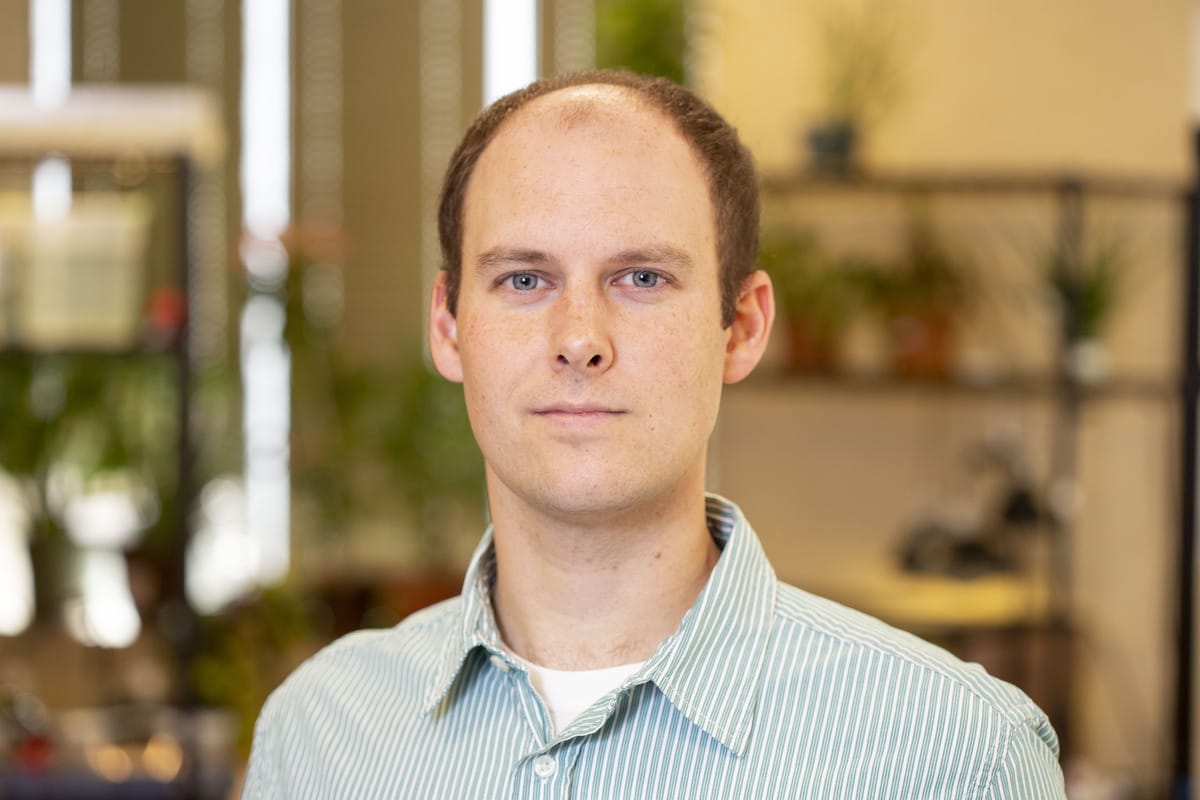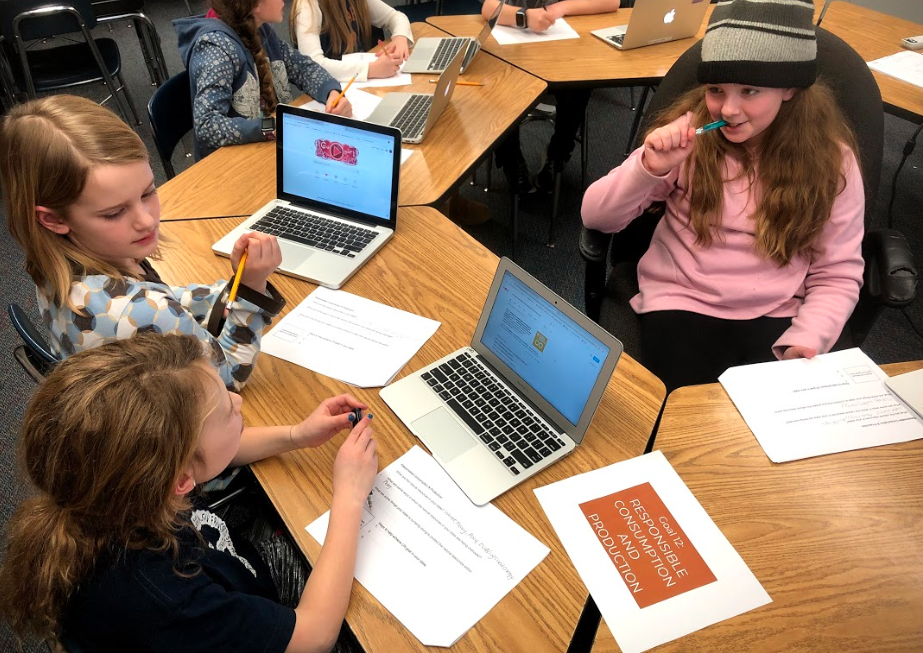The Van Andel Education Institute strives to be a place where teachers of all backgrounds are recognized and empowered. Our Blue Apple Teacher Feature is a bi-weekly blog where we introduce readers to the amazing educators who are building classrooms where curiosity, collaboration, and creativity thrive! What does every teacher hope for their students? How can parents foster growth and determination within their children? If you’re interested in discovering the answers, take a moment and acquaint yourself with Paul Solarz, an elementary teacher, proud defender to student-centered learning, and author of the environmentally-conscious Blue Apple project, State of Sustainability.
Paul Solarz has been teaching at Westgate Elementary School in Arlington Heights since 1999. He’s a vocal advocate for student-centered teaching practices and twenty-first century skill attainment. His students spend time each week pursuing personal interests during Passion Time (a.k.a. Genius Hour) and maintain personal ePortfolios of their work in class. He’s published a book entitled, Learn Like a PIRATE, which gives teachers ideas for empowering students to collaborate and become stronger leaders while effectively leading the classroom. In 2015, he was named a Top 50 Finalist for the Varkey GEMS Global Teacher Prize, and was also named the 2014 Educator of the Year by Illinois Computing Educators.
Why did you get involved in education?
As a youngster, I never thought I’d become a teacher! I was one of those kids who didn’t want to spend any more time in school than absolutely necessary! Little did I know that I would enjoy working with kids so much! As a high schooler, I spent a couple summers working as a camp counselor, being the Nature Director of several summer camps. The kids loved the activities I had planned and the parents always reported how much fun their children had. I was told that I needed to become a teacher because they thought I had a gift.
What do you believe are the greatest challenges facing teachers today?
Today’s teachers face dozens of challenges that make teaching harder than it should be. The toughest challenges that I have had to deal with in my career would include unrealistic expectations from administration, unkind communication from some parents, the need for autonomy to make the right decisions for each student, and the lack of time to get things done without having to spend every evening and weekend working! Many of my colleagues around the U.S. deal with equity issues with regard to funding their schools. Technology is unfairly distributed, professional training varies tremendously, and teacher salaries are consistently below where they should be. Safety is becoming more and more of a concern, and respect in the profession is diminishing as school districts do everything to avoid lawsuits from upset parents.
What do you believe are the greatest challenges facing students today?
Students feel pressure from the adults in their life to take harder and harder classes, get better and better grades, all while managing to participate in sports, clubs, maintain a part-time job, do community service, and have a social life. The amount of homework children as young as five or six receive each night can be beyond overwhelming, with teachers often not realizing the special needs of each student (not to mention their additional responsibilities outside of school). The amount of peer pressure kids are feeling to vape, smoke, drink, take drugs, etc. is a never-ending problem. Finally, teens & tweens are constantly dealing with drama from friends and acquaintances that causes them them to stress out about social responsibilities and hurt feelings.
What tools have you found most useful for inspiring students to think critically and creatively?
The best tool I’ve used to get my students thinking critically and creatively is our ePortfolio. Each of my 4th graders maintains a blogroll on our Weebly classroom website. Here, they reflect on learning experiences, upload pictures and videos of classroom activities, answer synthesis questions, and comment on each others’ work. This means of displaying student work which provides students with an authentic audience and purpose that motivates students to try their best! Creativity and deep thought can be observed in many of the blog posts and parents and extended family often comment on how cool it is to see what they’re doing in class!
How would you like to see education change in the next ten years?
It would be nice to see schools move towards giving teachers more autonomy to incorporate new pedagogy and non-required activities into their teaching. I’d like to see a focus on skills-acquisition over content knowledge, and a focus on improvement over perfection. Currently, teachers feel the pressure to teach ALL of the curriculum no matter how ridiculous it might feel. They’re often told what to say and when to say it. Programs try to dummy-proof education so anyone can teach it, but the reality is that most teachers are far more competent than that and need to be trusted to make intelligent decisions if they have opinions! I’d rather see teachers provide students with experiences that lead them to become lifelong learners who have skills that are transferable to new situations than teach each student how to play the game of school!
How can parents assist students in developing curiosity and iterative thinking?
Parents who encourage their child to ask questions help them become more curious about their world. Admitting when you don’t know answers and taking the time to figure it out teaches children to be comfortable not being perfect and also to be resourceful. Pointing out your mistakes to your child helps them learn that you’re not embarrassed to be wrong and you don’t always need to be right! Asking your child how we can make something better (and then making it better) teaches the importance of incremental improvements leading to a better product, but understanding that things never have to be perfect is important too! In our family, we talk about improving dinner recipes, slime “recipes,” artwork, writing, etc.
What is one of the most authentic learning experiences you’ve ever done with your students?
It’s hard to pick just one, because I crave authentic learning experiences! Some of my favorites include our alternative energy debates where students researched an energy source like solar energy, presented arguments during a formal debate to another energy source, defended their source against other arguments, and used online evidence to support their claims. Another favorite is any of our simulations where my students become a character in an experience (like Colonizing Mars to create our own country or moving west along the Oregon Trail). My students and I role play certain scenarios that lead to problems they need to solve. They collaboratively research how to solve each problem that I pose, and then learn what the consequences of their actions are. At the end of each lesson, students creatively reflect on their experiences through video, story-telling, and other online means.
What do you wish for each student?
I wish that every student would come to school knowing that there are people there who care for them, friends who want to see them, and that all of their needs will be met while in school. Whether their home is a safe & positive environment or not, school needs to be that for every child.
About the Project: State of Sustainability
Every state is uniquely great. From coastline to mountains to rolling prairies, our landscape is diverse.Imagine if thousands of kids just like yours were able to promote sustainable practices and become agents of change. What an incredible force for good!


